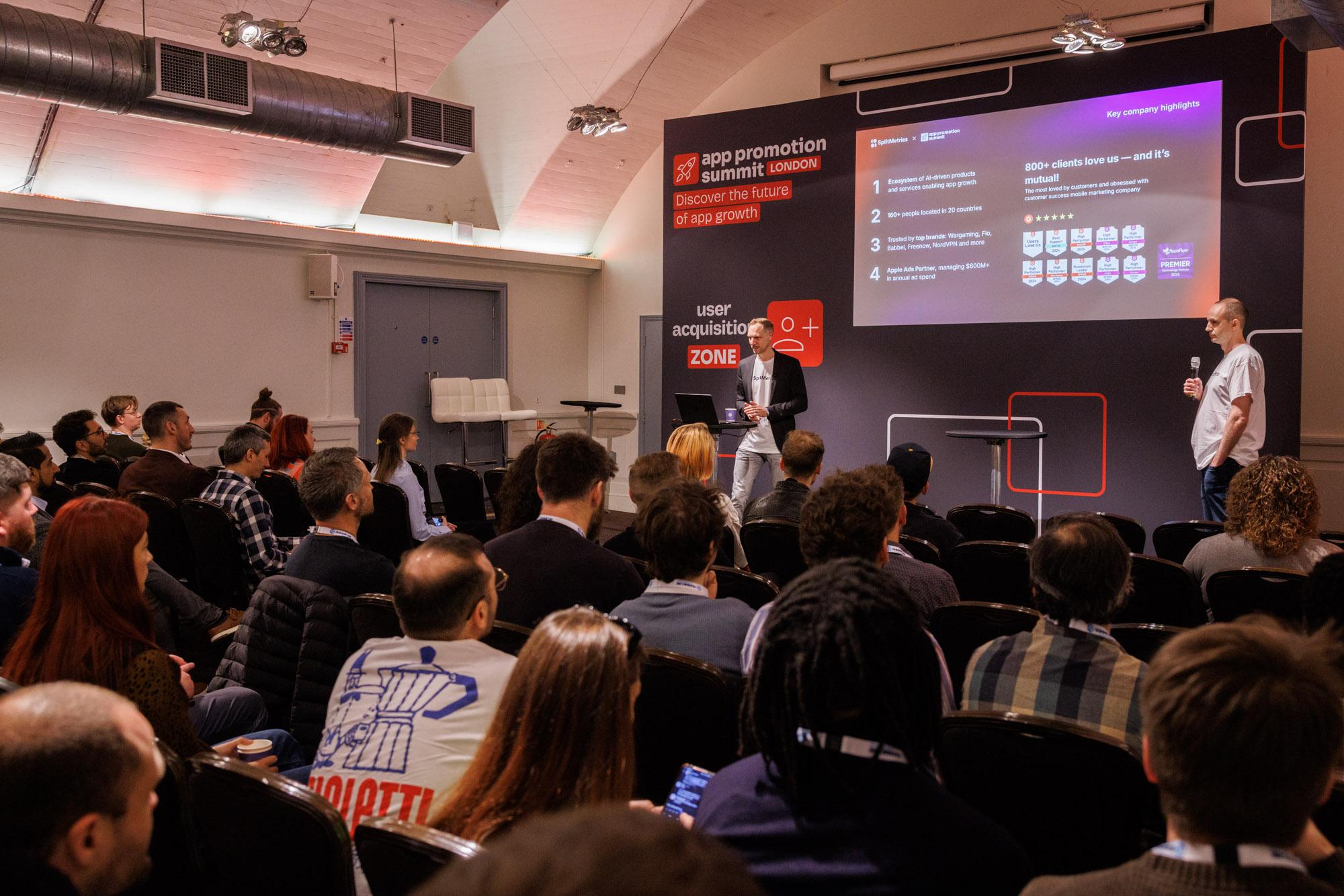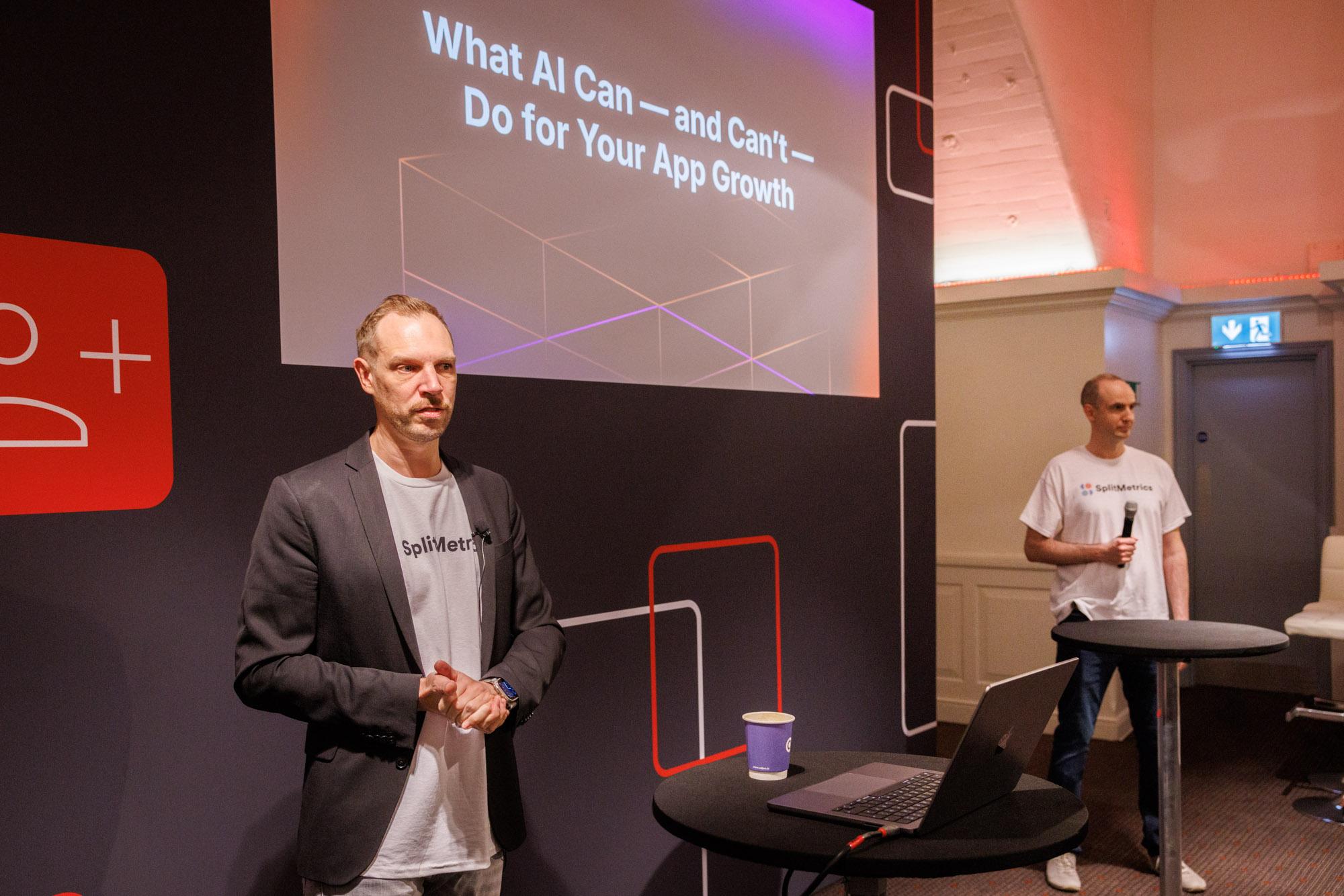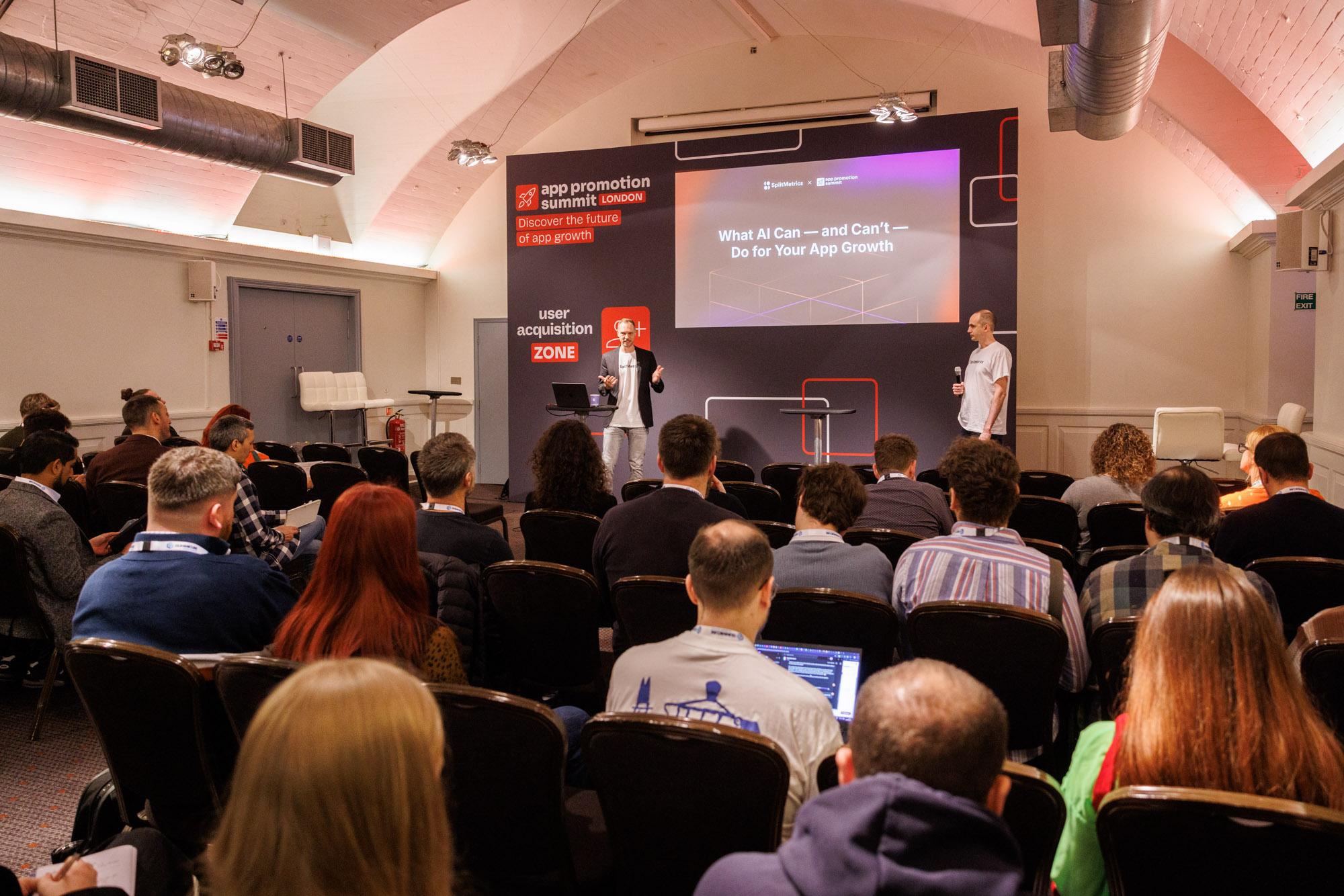Mobile app marketers are witnessing a seismic shift in campaign performance as artificial intelligence systems demonstrate the ability to deliver dramatic revenue increases without human oversight. New data from SplitMetrics, presented at App Promotion Summit London 2025, reveals that AI-powered optimization achieved a 55% increase in return on ad spend while maintaining identical budgets, marking a watershed moment for automated marketing.
“We’re seeing something unprecedented,” said Thomas Kriebernegg, AI Marketing Leader, General Manager at SplitMetrics, during his presentation to a room of spellbound app marketers. “The same input, the same money, but 55% more revenue. And crucially, no humans were involved in the optimization process.”
The breakthrough comes as mobile app advertising reaches a critical juncture, with marketers increasingly overwhelmed by the complexity of managing campaigns across multiple platforms while competition for user attention is intensifying by the day.
The performance breakthrough
The numbers tell a compelling story that extends far beyond a single success metric. SplitMetrics’ case studies showed AI systems consistently maintaining target cost-per-acquisition levels even as marketing managers became “more greedy” and repeatedly lowered their targets. AI technologies proved capable of adapting in real-time, never overstepping budget constraints while continuously improving performance.
But perhaps most striking was the volatility reduction. Traditional Apple Search Ads campaigns experience significant fluctuations in performance, requiring constant manual adjustments and monitoring. The AI-managed campaigns showed markedly smoother performance curves, eliminating the peaks and valleys that typically plague ASA campaigns.
One campaign tracked over several months revealed the AI system’s responsiveness to changing business requirements. As the marketing team repeatedly adjusted their target CPA downward, the system adapted seamlessly, maintaining performance consistency that would typically require a team of specialists working around the clock.
App growth and AI: Understanding the potential and limits
Source: App Promotion Summit
The always-on advantage: 60+ market signals processed every second
Picture this: while a human marketing manager checks their dashboard once or twice daily, an AI system processes 60 distinct market signals every second. Search popularity shifts, competitor bid changes, impression volume fluctuations, keyword performance variations – all feeding into decision-making algorithms that operate at machine speed.
“The data layer is where the magic happens,” explained Andrey Rekalo, Director of Data & AI at SplitMetrics. “We’re combining external market intelligence with proprietary performance data to create a real-time understanding of market dynamics that no human could possibly maintain.”
Importantly, this isn’t just about processing more information faster. The AI systems identify patterns across multiple data streams simultaneously, correlating search trend changes with competitor behavior, seasonal fluctuations with user acquisition costs, and historical performance with emerging opportunities. Where human marketers might spot one or two relevant trends, AI systems weave together dozens of signals into actionable insights.
The technical architecture resembles a sophisticated early warning system. Market shifts that might take human analysts days to identify and weeks to act upon are detected and responded to within minutes. Bid adjustments happen automatically, budget reallocation occurs in real-time, and strategic pivots execute without human intervention.
The 90% revolution, or why AI won’t replace app marketers
Here’s the reality check that every marketing professional needs to hear: AI solves 90% of optimization problems, but that final 10% remains stubbornly human. And in an industry where marginal gains determine success or failure, that 10% matters enormously.
Consider, for example, what ChatGPT can and cannot do for App Store Optimization. Ask it to write product descriptions, and you’ll get solid results. Request multiple headline variations, and it delivers efficiently. But instruct it to optimize a Google Play long description while incorporating specific keywords, maintaining character limits, and preserving brand voice? The system struggles with this multi-layered complexity.
The same limitation applies to emotional campaign development. AI excels at generating functional copy but fails at creating the breakthrough ideas that drive viral adoption. It can brainstorm features but cannot solve fundamental product-market fit challenges. The technology augments human creativity rather than replacing it.
“Think of AI as a brilliant intern who never sleeps, never complains, but occasionally spills coffee on your keyboard instead of pouring it into your cup,” Rekalo noted. “Supervision remains essential.”
This creates an interesting professional evolution. Marketing roles are shifting from manual execution toward strategic oversight. Instead of spending hours adjusting bids and analyzing performance data, marketers focus on goal-setting, creative strategy, and interpreting AI-generated insights. The work becomes more strategic, less tactical.
Immediate opportunities
For marketing professionals wondering when this transformation will affect their work, the answer is now. The technology is already actively managing campaigns and delivering results.
The skills that become more valuable are strategic thinking, creative problem-solving, and business objective translation. Technical campaign management skills remain relevant but shift toward AI system oversight rather than manual execution. Understanding how to effectively collaborate with AI systems becomes as important as traditional marketing expertise.
Marketing managers should begin experimenting with AI-powered optimization tools, starting with lower-risk campaigns to understand capabilities and limitations. The learning curve involves understanding when to trust AI decisions and when human intervention remains necessary.
Industry experts recommend developing AI literacy, i.e. a practical understanding of how AI systems work, what they can and cannot do, and how to maximize their effectiveness. This knowledge will increasingly differentiate successful marketers from those struggling to adapt.
The mobile app marketing industry stands at an inflection point. The 55% revenue improvements and operational transformations demonstrated at APS London suggest AI integration is fundamentally changing how app marketing works. For professionals willing to embrace this change, the opportunities are substantial. For those who resist, the competitive disadvantage may prove insurmountable.




















